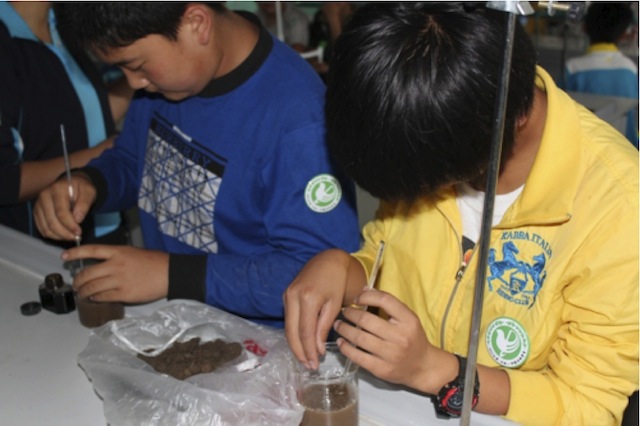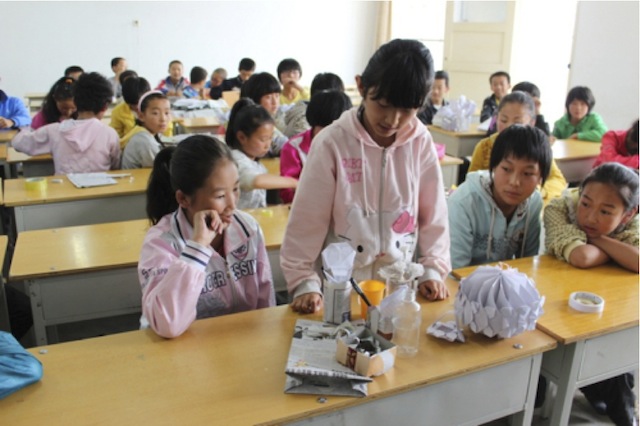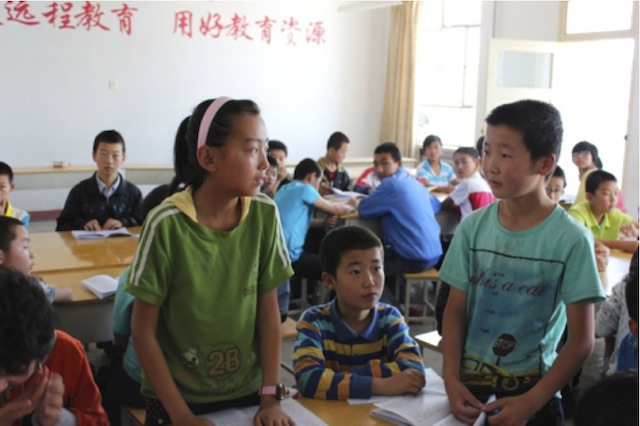Inspiring rural children to learn about science, the environment, language skills, culture and art, music and ...

FOCAL POINTS
- Rural Youth Science Ca...
09/13/2024
- Rural Education in the...
1/1/2023
- The Tin Ka Ping Founda...
12/2022
- Sanhe Library in 2021
12/02/2021
- Foreword: ESS Opens a ...
03/01/2021
- 2020 Innovative Teachi...
- 2019 Teacher Training ...
- 2019 Summer Camps for ...
- a. Science Summer Camp...
- b. Science Camps in Wu...
- c. Science Camps in Ch...
- d. Science Camps in In...
- e. Summer Camps in Hun...
- 2016 ESS Financial Aid...
- 2016 ESS Adopt A Rural...
- Taking on Three Decade...
- On Producing the ESS DVD
05/09/2009
- Improve Teaching and L...
- SERC Program Diagram
- SERC Program Results
- NBC Feature on ESS
10/19/2007
Science Camp in a Minority Region in Gansu Province
Hao Xue, Northwestern Normal University
Zhida Song-James, Education and Science Society
Gansu in Northwestern China still has a large population living below the poverty level. Due to limited resources, science education is particularly weak for the many schools in mountainous areas, particularly those in the regions inhabited by minority peoples. To help such schools improve science education and expose students to a new learning experience, the Education and Science Society (ESS) and Northwestern Normal University (NWNU) worked together to organize a summer Science Camp at No. 1 Middle School in Hezheng County in 2012.
About 100 kilometers southwest of Lanzhou, the provincial capital, Hezheng is located in the Linxia Hui Autonomous Prefecture, where 57.4 percent of the population is predominantly Hui Muslims. Founded in 1955, No. 1 Middle School is home for more than 2,000 students, over 70 percent from rural families. Dr. Qin Dahe, the leading Chinese glaciologist and the first Chinese to cross the South Pole, used to teach here. His story has inspired interest in science among the students, and helped the school build a tradition of advocating science education.
However, the 90 campers came from rural areas that lack adequate infrastructure for waste water and solid waste disposal. Moreover, the isolation and limited education of the people living in these areas have led to further deterioration of their environment. We selected "Protect Our Living Environment" as the theme of the Hezheng science camp, with the hope that the campers would learn more about their environment and share what they learn with their families and neighbors, ultimately raising general environmental awareness in the local communities.
All the campers are 7th and 8th grade students. The five-day camp has four major activities: introductory lectures and movie viewing, a science laboratory on water quality and treatment, a project on recycling domestic trash, and a contest to display environmental knowledge.
Science Lab - Problem Solving
 |
In a typical science class in school, students listen to lectures and watch a demonstration by the teacher but seldom have a chance to apply the knowledge to resolve a problem. To develop the problem solving capability of the campers, we conducted an experiment in water treatment. After a brief lecture introducing water purification processes, the campers were organized into small groups and started their own projects.
The first step was to prepare water samples. The local pollution sources are mainly domestic waste and sediment. The campers added soil, shredded plastic bags, withered leaves and ink to "sewage water" provided by the teachers to create a polluted water sample. Then they observed and recorded the color and odor of the sample, and tested its pH value.
The next step was to purify the water. Each group was asked to create its own device and use it to treat the polluted water. The campers brainstormed and created a variety of devices: some assembled beverage bottles, filled by different purification agents such as alum and activated carbon; others made treatment bags from layers of gauze containing alum and activated carbon for the water to flow through. All the groups finally accomplished their task successfully and enjoyed the process very much. We were so proud of our campers - with hardly any laboratory experience, they were undeterred by the challenges they faced in designing the processes themselves!
Protecting Our Natural Resources by Reuse and Recycle
There is no recycle program in this area, yet large amounts of solid wastes being created daily could be recycled or reused. The camp dedicated one day to promote reuse and recycling, with the theme "I am a reuse expert." Campers were asked to bring "junk" from
 |
their homes. They enthusiastically collected newspapers, empty bottles, packaging materials, cartons, and old playing cards. As an introduction, we played a video on reuse and recycling opportunities showing a few examples for reusing the "junk." The campers quickly demonstrated their creativity. They made decorative vases using paper and beverage bottles, lanterns from old yarns and paper, document boxes which can be used in offices, even toy trains and a toy aircraft carrier. Each group proudly presented their products and shared their thoughts and methods. Afterwards all watched the video "Animal United" together. The campers enjoyed the story, which raised their environmental awareness and brought better understanding of the urgent need for the protection of natural resources.
Environmental Knowledge Contest
 |
This was the most existing and memorable event. It was held on the last day of the camp. Campers were asked questions about material in a booklet distributed on Day One of the camp. The questions were classified into three groups: "must answer" (score awarded to all correct answers), "grab and answer" (score awarded only to the first correct answer), and "take your risk" (negative scores given to each incorrect answer). Campers jumped up and down, cheered for each correct answer and sighed for each wrong one. Finally, a judging board awarded first, second and third prizes. All the participants received souvenirs.
A Note from the NWNU Team
This is the second year for the NWNU team to participate in the ESS Science Camp program. Last year's experiences laid the foundation for this year's success. We are encouraged by the positive feedback from campers and the recognition by Hezheng County and the local schools. We are confident that the program will continue to improve as the team carries out more activities of this kind in the future.

